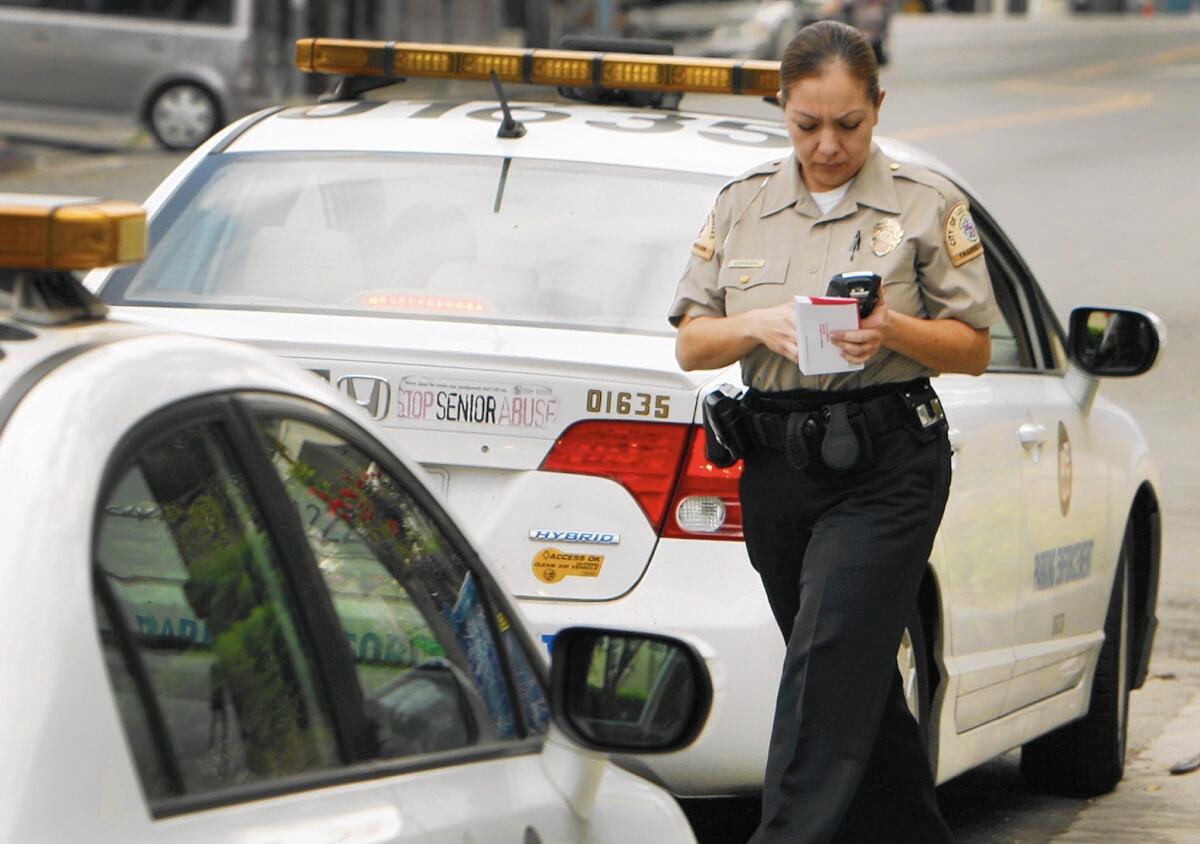An odd-looking traffic citation, but it shouldn’t be ignored

- Share via
It was good news for California drivers when the state Supreme Court moved last week to end a requirement that people pay traffic tickets before being allowed to contest them.
But what if a ticket goes out of its way to seem as if it can be safely ignored?
What if it includes fine print saying the citation wasn’t issued “for any violation of any provision of the California Vehicle Code”?
And what if the ticket specifies that failure to pay the $100 fine won’t be included on your driving record and won’t be reported to your insurer?
“The first thing I thought was ‘What the heck is this?’” said Northridge resident Dan Duehren, who received just such a ticket in February from something called the Mountains and Recreation Conservation Authority, an entity he’d never heard of.
“It looked like a scam,” he said. “There’s no way I was going to send them money.”
It’s easy to see why Duehren, 67, and numerous others who have posted similar experiences online would conclude they’re being duped. Think of all the official-looking documents that arrive in the mail that turn out to be from sneaky mortgage lenders or bogus property-title companies.
Earlier this month, Duehren received a questionable default notice informing him that a penalty fee had been tacked on and he now owed $110 for his traffic violation.
“It still looks fraudulent,” he said.
It’s not. And ignoring these tickets and warnings is a mistake that could result in your credit score being trashed by debt collectors.
First off, the Mountains and Recreation Conservation Authority is a real thing. It oversees almost 69,000 acres of Southern California parkland, watershed areas, trails and wildlife habitats, mostly in the Santa Monica Mountains.
Jeff Maloney, chief staff counsel, told me that state law provides “pretty broad authority” for the agency to enforce relevant ordinances, such as ticketing people who walk their dogs off-leash.
Traffic safety around parks and trails is one of the agency’s top concerns, he said. As such, seven automated cameras have been installed near stop signs in four locations.
There are three in Franklin Canyon Park, two in Temescal Canyon Park, and one each at Marvin Braude Mulholland Gateway Park and Topanga State Park.
“The cameras are at fixed locations,” Maloney said. “They capture vehicle approaches to these stop signs.”
Duehren was driving his pickup truck into the Mulholland park to go mountain biking. He apparently failed to come to a complete halt at the stop sign. It was a Thursday morning and, he said, “there was nobody else around.”
Nevertheless, the camera caught Duehren’s traffic violation, and a $100 ticket automatically was issued.
I’m probably not the only one who thinks it’s problematic when tickets are issued by machines that can’t appreciate little things such as the fact that no one apparently was endangered.
It’s possible that had it been a cop or a park ranger who caught him, Duehren might be let off with a warning.
Traffic cameras in such out-of-the-way areas may be quite unexpected to many folks. Maloney said they’re necessary because “these can be very busy locations” and the cameras are “an extremely important part of our public-safety program.”
Perhaps. Or perhaps the roughly 24,000 traffic citations issued each year by the Mountains and Recreation Conservation Authority are an easy way of raising money at a time of severe budget constraints for state and local entities.
Maloney said the camera and ticketing program costs the agency about $780,000 annually and generates $1.5 million in revenue.
“It pays for itself,” he said. “And all the money goes back into the park.”
Whatever else, I give the agency an “F” for communication. Is it deliberately trying to confuse people by stating that tickets aren’t for a violation of the California Vehicle Code or that non-payment won’t harm your driving record?
Maloney explained that the agency wants to keep things civil and not have people charged with crimes. To do so, he said, could result in people having their license suspended or facing an arrest warrant.
“We wanted to make it clear that this is a serious thing, but it’s not criminal,” Maloney said. “It’s administrative. That means you won’t have a warrant out for your arrest, but we can still try to collect the debt, just like a credit card company.”
If that’s your story, tell it clearly to people who receive citations. As it stands, many people online say only a chump would pay these tickets. Best to just ignore them, they say.
Maloney said he’s seen the same posts and can respond only by saying that “these folks do that at their own risk.”
“One hundred percent of people who don’t pay are sent to debt collectors,” he said.
Maybe the collectors will back down, maybe they won’t. But is it really worth putting your credit on the line for a traffic ticket?
I’ll say this: The California Supreme Court is correct in shielding drivers from potentially hundreds of dollars in fines before even being allowed to challenge a ticket. The court’s emergency rule should be adopted.
Meanwhile, no matter how far out in the boonies you may find yourself, a stop sign means stop. You may be sorry if you don’t.
David Lazarus’ column runs Tuesdays and Fridays. He also can be seen daily on KTLA-TV Channel 5 and followed on Twitter @Davidlaz. Send your tips or feedback to [email protected].
More to Read
Inside the business of entertainment
The Wide Shot brings you news, analysis and insights on everything from streaming wars to production — and what it all means for the future.
You may occasionally receive promotional content from the Los Angeles Times.










